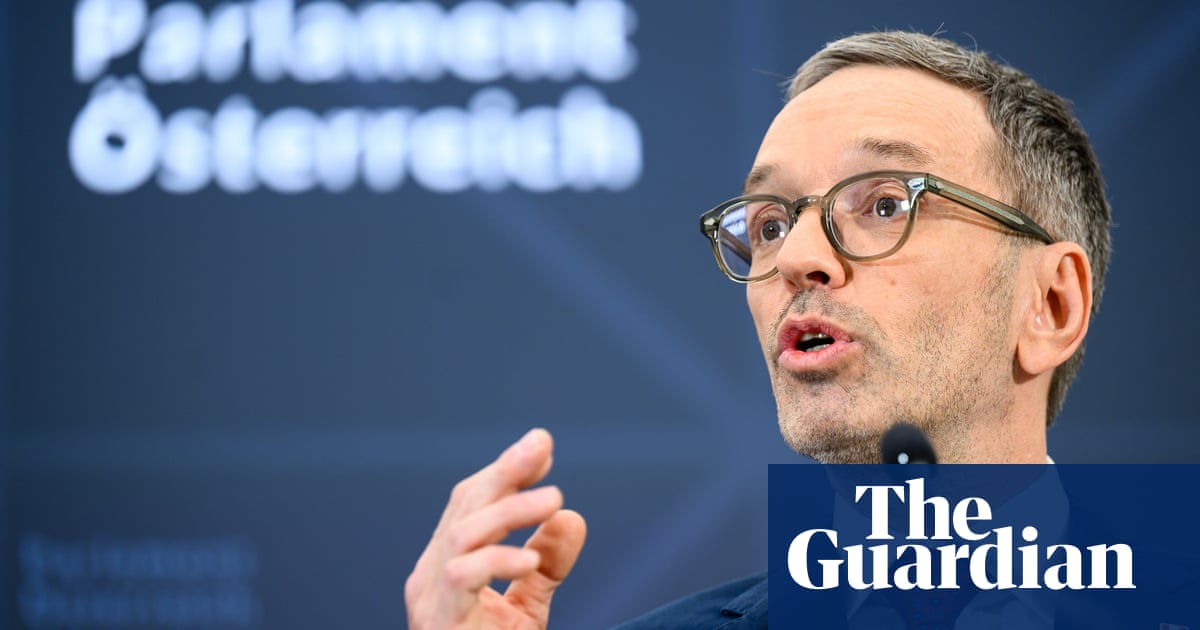Photo credit: www.theguardian.com
The Rising Influence of Austria’s Freedom Party in European Politics
The landscape of European politics is witnessing significant shifts as Austria’s Freedom Party (FPÖ) emerges from a strong electoral showing, reminiscent of its controversial entry into the government 25 years ago. Back then, the FPÖ’s entrance into a coalition prompted widespread concern across Europe, leading to the imposition of punitive measures and the cancellation of diplomatic visits. This time, however, the stakes are even higher as the FPÖ, now under the leadership of Herbert Kickl, stands poised to lead the government.
Kickl’s ascent symbolizes a broader trend of far-right ideologies gaining traction throughout Europe. His party, characterized by its nativist stance, anti-immigration policies, and skepticism towards the EU, advocates for a radical shift in Austria’s political landscape. Should he take on the role of chancellor, Kickl would join a coalition of like-minded leaders from Hungary, Slovakia, and potentially the Czech Republic following upcoming elections, forming a bloc of nations increasingly at odds with established EU protocols.
Despite the concerns that have historically accompanied the rise of such parties, the response from EU institutions now appears more subdued. A diplomat from a prominent EU member state remarked, “We’re going to have to deal with it, aren’t we? It’s the new normal.” This reflects an unsettling acceptance of the political changes sweeping across the continent.
The FPÖ recently captured 29% of the votes in September’s elections and is currently negotiating with the Austrian People’s Party (ÖVP), as talks with other political factions failed. Analysts suggest that, given the current public sentiment, a coalition is likely to materialize soon, despite ongoing uncertainty surrounding the precise terms of this agreement.
In a preemptive move, Austria’s caretaker chancellor, Alexander Schallenberg, attended meetings in Brussels to reassure EU leaders of Austria’s commitment to the union. He emphasized that Austria would maintain its position as a “reliable, strong, and constructive partner” within the EU. He assured the bloc that key tenets, such as the rule of law and respect for international obligations, would be preserved in any new coalition arrangement.
However, the FPÖ’s campaign rhetoric has raised questions about its adherence to these principles. The party’s election manifesto, titled “Fortress Austria, Fortress of Freedom,” proposed stringent measures such as an immediate cessation of immigration and the suspension of the country’s asylum system. These demands could clash with EU regulations and suggest a readiness to confront established norms if they are elected to govern.
While some political analysts believe that a coalition deal with the ÖVP could temper Kickl’s more extreme agendas, others are skeptical about the center-right party’s capacity to impose limits on its far-right counterpart. Historical precedents show that previous collaborations between the two parties have led the ÖVP to accommodate many of the FPÖ’s controversial positions, raising alarms about potential erosions of democratic norms.
If Kickl does assume the chancellorship, expectations about his administration’s focus could shift towards domestic priorities, such as budgetary issues and welfare reforms, rather than aggressive EU confrontations. However, the degree to which the ÖVP can curb FPÖ’s political impulses remains uncertain, particularly given their past cooperative engagements.
The geopolitical implications of a Kickl-led government could extend far beyond Austria. Should he align closely with other disruptive leaders like Hungary’s Viktor Orbán, EU policies requiring unanimous agreement could face substantial hurdles. Key initiatives, including support for Ukraine, the European Green Deal, and the bloc’s new asylum system, may be jeopardized if a coalition of far-right parties solidifies its power across the region.
Currently, far-right parties govern in multiple countries, including Italy and Hungary, with additional support observed in nations like the Netherlands and Sweden. There are also indications of rising far-right sentiment in countries such as France and Romania, complicating the political calculations of established parties across Europe.
Despite the significant shifts, some analysts maintain that anti-EU governments will still lack the blocking minority necessary in the European Council to fundamentally disrupt decision-making processes. However, the willingness of center-right parties to engage with enshrined far-right movements remains a pressing concern that may define the next wave of policy debates within the EU.
The European People’s Party (EPP), which includes members of the ÖVP, faces scrutiny for its willingness to court far-right votes amidst growing challenges across the continent. Alignments with national-conservative factions signal a potential shift in the dynamics of EU parliament, paving the way for increased collaboration among radical right parties on the legislative front.
As the political climate in Austria evolves, the potential ramifications for European unity and stability loom large. The interplay between established democratic norms and rising far-right sentiments will be crucial in shaping the future of the continent.
Source
www.theguardian.com

